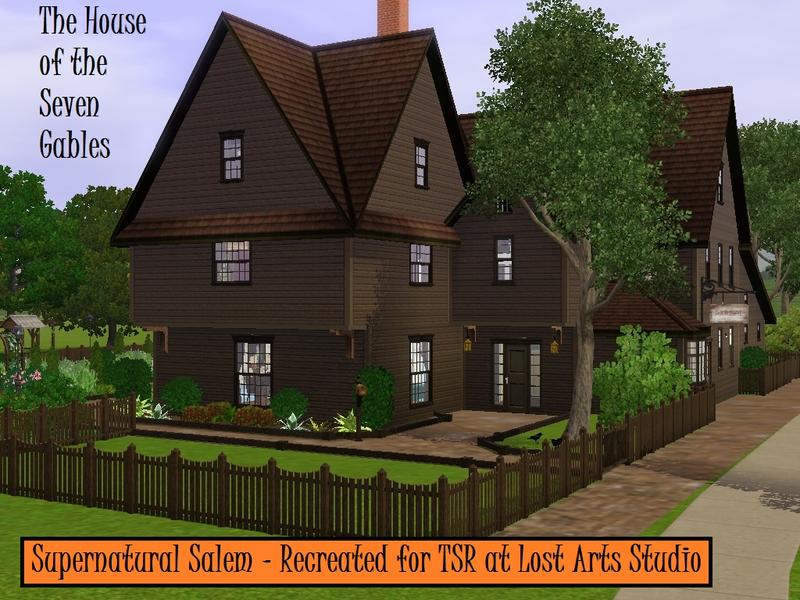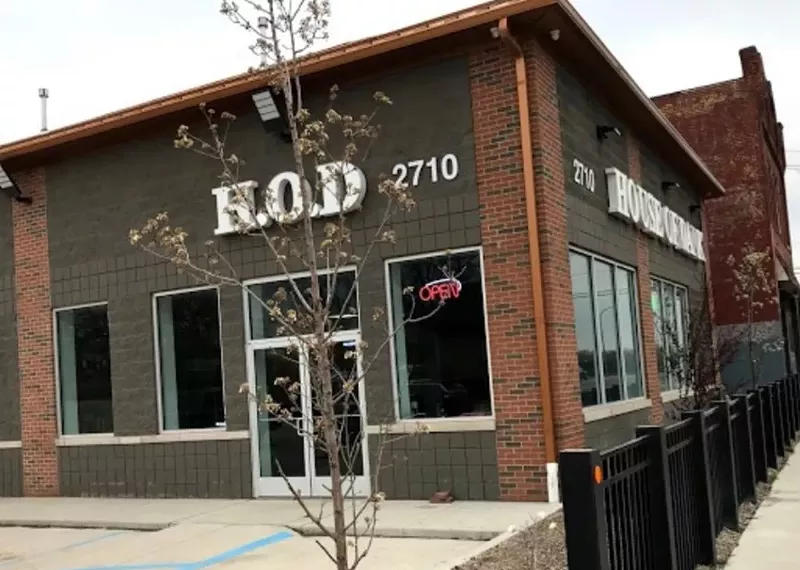Table Of Content
She appeared to have nopreliminary design, but gave a touch here and another there; brought somearticles of furniture to light and dragged others into the shadow; looped up orlet down a window-curtain; and, in the course of half an hour, had fullysucceeded in throwing a kindly and hospitable smile over the apartment. Nolonger ago than the night before, it had resembled nothing so much as the oldmaid’s heart; for there was neither sunshine nor household fire in onenor the other, and, save for ghosts and ghostly reminiscences, not a guest, formany years gone by, had entered the heart or the chamber. Phœbe Pyncheon slept, on the night of her arrival, in a chamber that lookeddown on the garden of the old house.
The House of the Seven Gables: Characters
There is no greater bugbear than a strong-willed relative in thecircle of his own connections. But the Judge showed a singular determination to enter unannounced; and asPhœbe, with the vivacity of a person whose movements unconsciously answer toher thoughts, had stepped towards the door, he used little or no ceremony inputting her aside. But it is too fruitful a subject, this of hereditary resemblances,—thefrequent recurrence of which, in a direct line, is truly unaccountable, when weconsider how large an accumulation of ancestry lies behind every man at thedistance of one or two centuries.
VI: Maule's Well
Despite his growing notoriety, Hawthorne was forced to pursue alternative means of supporting his family. In 1842, he took his first political appointment with the Boston Customhouse. During this time, Hawthorne published his second book of stories, Mosses from an Old Manse. When Zachary Taylor took the presidency in 1849, Hawthorne lost his appointment in Salem and again turned to writing. He published The Scarlet Letter, one of his best-known novels, in 1850. The novel was a bestseller and was quickly followed by The House of the Seven Gables (1851), which proved to be another success.
EXCHANGE: Mansion on the move in Wheaton - The Seattle Times
EXCHANGE: Mansion on the move in Wheaton.
Posted: Fri, 22 Sep 2017 07:00:00 GMT [source]
The Secret Garden
The old gentlewoman stole behind Phœbe, and peeped from the passageway intothe shop, to note how she would manage her undertaking. A very ancient woman, in a white short gown and a green petticoat,with a string of gold beads about her neck, and what looked like a nightcap onher head, had brought a quantity of yarn to barter for the commodities of theshop. She was probably the very last person in town who still kept thetime-honored spinning-wheel in constant revolution.
Clifford’s Chamber
By the spell of contrast, another portrait rose up before her, painted withmore daring flattery than any artist would have ventured upon, but yet sodelicately touched that the likeness remained perfect. Malbone’sminiature, though from the same original, was far inferior to Hepzibah’sair-drawn picture, at which affection and sorrowful remembrance wroughttogether. Soft, mildly, and cheerfully contemplative, with full, red lips, juston the verge of a smile, which the eyes seemed to herald by a gentlekindling-up of their orbs!
Thomas Maule
Not that he laid claim to the tithe pig; but, as ananalogous mode of reverence, he went his rounds, every morning, to gather upthe crumbs of the table and overflowings of the dinner-pot, as food for a pigof his own. Her hereditaryreverence made her afraid to judge the character of the original so harshly asa perception of the truth compelled her to do. But still she gazed, because theface of the picture enabled her—at least, she fancied so—to readmore accurately, and to a greater depth, the face which she had just seen inthe street. In his youth, he had probably been considered a handsome man; at his presentage, his brow was too heavy, his temples too bare, his remaining hair too gray,his eye too cold, his lips too closely compressed, to bear any relation to merepersonal beauty.
Time, the continual vicissitude of circumstances, and the invariableinopportunity of death, render it impossible. If, after long lapse of years,the right seems to be in our power, we find no niche to set it in. The betterremedy is for the sufferer to pass on, and leave what he once thought hisirreparable ruin far behind him.
Nor was Clifford incapable offeeling the sentiment of poetry,—not, perhaps, where it was highest ordeepest, but where it was most flitting and ethereal. It was impossible toforetell in what exquisite verse the awakening spell might lurk; but, onraising her eyes from the page to Clifford’s face, Phœbe would be madeaware, by the light breaking through it, that a more delicate intelligence thanher own had caught a lambent flame from what she read. One glow of this kind,however, was often the precursor of gloom for many hours afterward; because,when the glow left him, he seemed conscious of a missing sense and power, andgroped about for them, as if a blind man should go seeking his lost eyesight. On perceiving a young rose-bud of a girl, instead of the gauntpresence of the old maid, a look of surprise was manifest. He at first knit hisbrows; then smiled with more unctuous benignity than ever.
The House of the Seven Gables Full Book Summary
Alicesat in an attitude of profound repose, with the long brown lashes drooping overher eyes. According to some versions of the story, a regular contract to the above effectwas drawn up by a lawyer, and signed and sealed in the presence of witnesses.Others say that Matthew Maule was contented with a private written agreement,in which Mr. Pyncheon pledged his honor and integrity to the fulfillment of theterms concluded upon. The gentleman then ordered wine, which he and thecarpenter drank together, in confirmation of their bargain.
This means that the narrator, who is not a character in the story, tells the events of the story from a "godlike" perspective. The narrator knows everything about the characters and the events, past and present, relating to the action of the story. In the story that Holgrave relates to Phoebe, Gervayse is said to have returned from Europe and begun to search for the deed to the land in Maine that the Colonel was in the process of acquiring at the time of his death. Gervayse summons the younger Matthew Maule to the house and makes a deal to give him the House of the Seven Gables in exchange for information about the missing deed. Matthew (the younger) then hypnotizes Alice, who eventually dies due in part to his mistreatment of her. Despite her ongoing attempts to care for Clifford, Hepzibah realizes that because she so horribly lacks the beauty he so adores, Phoebe is better equipped to tend to him.
What greatlystrengthens such a suspicion is the fact that this controversy between twoill-matched antagonists—at a period, moreover, laud it as we may, whenpersonal influence had far more weight than now—remained for yearsundecided, and came to a close only with the death of the party occupying thedisputed soil. The mode of his death, too, affects the mind differently, in ourday, from what it did a century and a half ago. It was a death that blastedwith strange horror the humble name of the dweller in the cottage, and made itseem almost a religious act to drive the plough over the little area of hishabitation, and obliterate his place and memory from among men.

But the young and happy are not illpleased to temper their life with a transparent shadow. Therefore, it was wellthat Phœbe so often chose sad themes, and not amiss that they ceased to be sosad while she was singing them. Discerning that Clifford was not gladdened by her efforts, Hepzibah searchedabout the house for the means of more exhilarating pastime. At one time, hereyes chanced to rest on Alice Pyncheon’s harpsichord.
After finding Judge Jaffrey Pyncheon dead, Clifford seems more equipped to embrace the future. As he and Hepzibah flee by train, he talks with a fellow traveler and lauds the advances of modern science and technology. Clifford's new attitude toward technology and his inherited wealth from Judge Jaffrey Pyncheon foretell a brighter future for him as well as for Hepzibah, Phoebe, and Holgrave, who all move out of the House of the Seven Gables to the judge's estate. Summer as it was, the east wind set poor Hepzibah’s few remaining teethchattering in her head, as she and Clifford faced it, on their way up PyncheonStreet, and towards the centre of the town.
When Clifford heard their sunny, buzzingmurmur, in the heart of the great yellow blossoms, he looked about him with ajoyful sense of warmth, and blue sky, and green grass, and of God’s freeair in the whole height from earth to heaven. After all, there need be noquestion why the bees came to that one green nook in the dusty town. They brought the rich summer withthem, in requital of a little honey. Within a few days after the appearance of this remarkable inmate, the routineof life had established itself with a good deal of uniformity in the old houseof our narrative. In the morning, very shortly after breakfast, it wasClifford’s custom to fall asleep in his chair; nor, unless accidentallydisturbed, would he emerge from a dense cloud of slumber or the thinner miststhat flitted to and fro, until well towards noonday.
All, as they approached, looked upward at the imposing edifice, whichwas henceforth to assume its rank among the habitations of mankind. There itrose, a little withdrawn from the line of the street, but in pride, notmodesty. Its whole visible exterior was ornamented with quaint figures,conceived in the grotesqueness of a Gothic fancy, and drawn or stamped in theglittering plaster, composed of lime, pebbles, and bits of glass, with whichthe woodwork of the walls was overspread. On every side the seven gablespointed sharply towards the sky, and presented the aspect of a whole sisterhoodof edifices, breathing through the spiracles of one great chimney. The manylattices, with their small, diamond-shaped panes, admitted the sunlight intohall and chamber, while, nevertheless, the second story, projecting far overthe base, and itself retiring beneath the third, threw a shadowy and thoughtfulgloom into the lower rooms.
Hepzibah refuses assistance because she wants to protect Clifford from Jaffrey. The judge threatens to have Clifford commited because he wants the dded to the lost land and believes that Clifford knows where it is. One day a pretty young girl arrives at the old house; she is Phoebe Pyncheon. Hepzibah is impressed with her niece's cheerful, wholesome, and helpful disposition and permits her to stay for a week or two.












